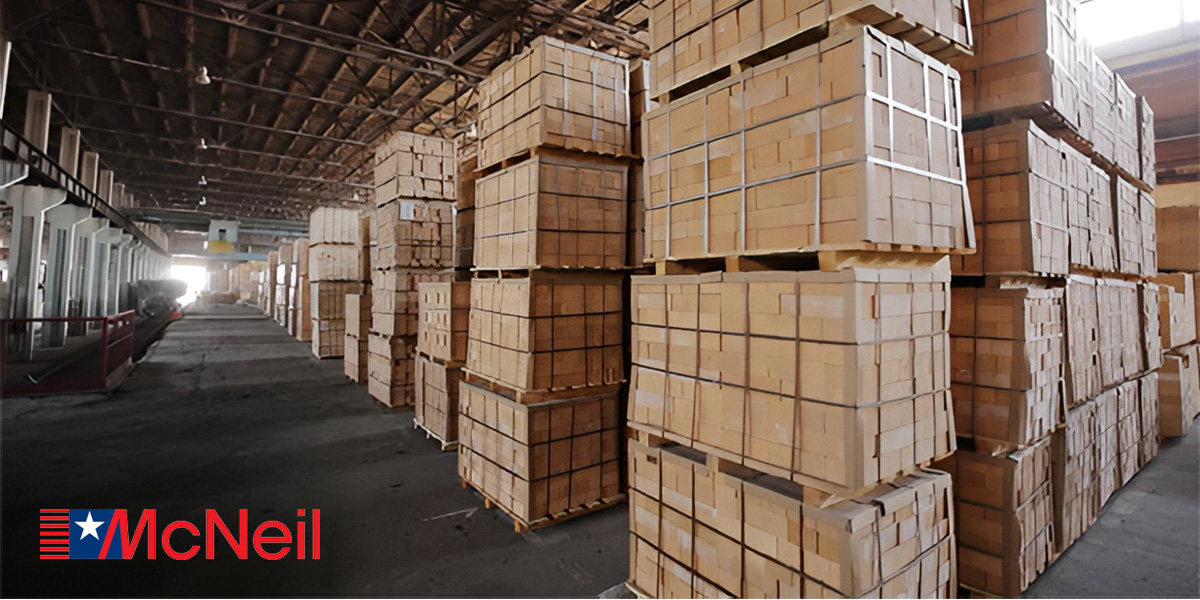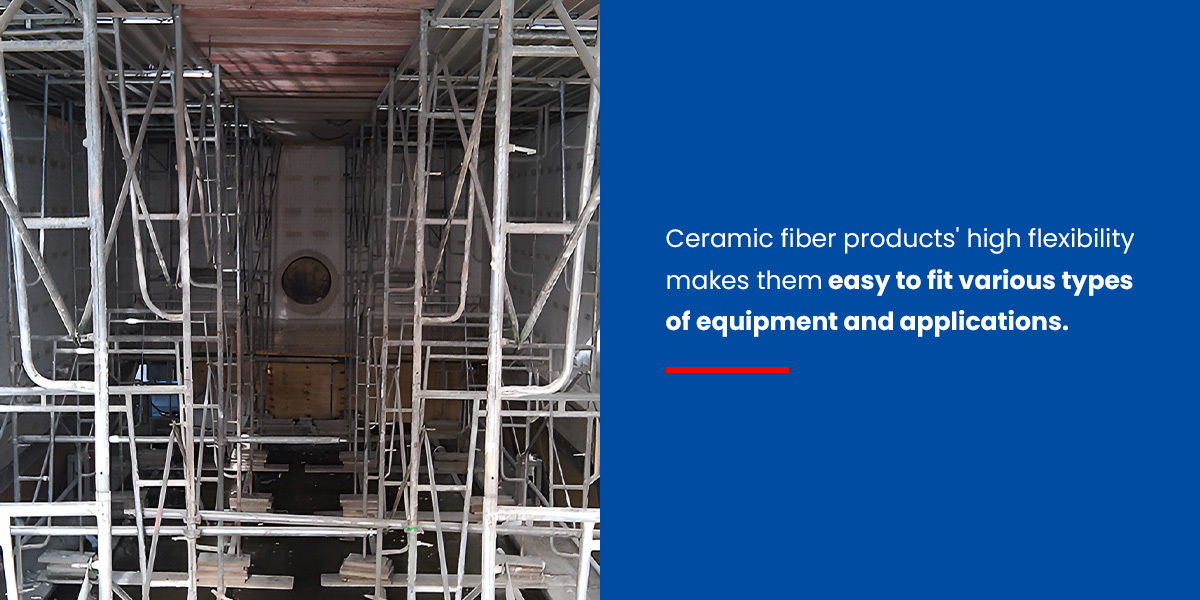Ceramic Fiber’s Role in the Oil and Gas Industry

Ceramic fiber plays a significant role in the oil and gas industry because it insulates high-heat equipment for enhanced safety, efficiency, consistency, productivity and cost savings. High-temperature equipment such as furnaces, boilers and flares rely on proper insulation to retain and disperse heat uniformly. Ceramic fiber’s low thermal conductivity enables it to hold heat in an insulated area efficiently while consuming less energy, allowing companies to boost productivity and reduce overhead costs.
What Is the Role of Ceramic Fiber Products?
Ceramic fiber products provide insulation and help minimize heat loss during oil conversion processes. Companies use high-temperature equipment to convert oil into useful products such as fuel, and this equipment requires proper insulation for the following reasons:
- Safety: Proper insulation prevents heat from transferring to a piece of equipment’s exterior surfaces, protecting workers from potential burns and nearby objects from damage. It also helps prevent fires by reducing the spread of flames.
- Efficiency: Insulation decreases heat loss so equipment can operate on less energy and help companies save money.
- Uniformity and consistency: Insulation helps equipment disperse uniform heat, which is essential for effective heat treatment. It also allows equipment to maintain thermal consistency throughout treatment processes and increase product quality.
Ceramic fiber products effectively insulate high-temperature equipment so it can operate reliably and efficiently. They serve as excellent alternatives to other insulation packages such as refractory bricks, gunite, asbestos millboard and mineral wool boards and blankets. Ceramic fiber is highly dependable and offers the lowest heat loss to ensure equipment retains as much heat as possible.
What Does Ceramic Fiber Do?
Ceramic fiber lines high-heat equipment in the form of boards, blankets, papers, felts or textiles. It features intertwined alumina silicate fibers and small voids that trap air, resulting in thermal resistance that enables it to withstand extreme temperatures. A ceramic fiber product’s unique composition restricts heat from moving through the material, preventing it from infiltrating or escaping an insulated area.
What Applications Do You Use Ceramic Fiber Products for in the Oil and Gas Industry?
Companies in the oil and gas industry use ceramic fiber to insulate high-heat equipment, such as the following:
- Boilers
- Cracking furnaces
- Distillation columns
- Fired heaters
- Flares
- Hydrogen and ammonia reformers
What Are the Properties of Ceramic Fiber Material?

Ceramic fiber products are highly durable and reliable because of the following properties:
- Low thermal conductivity: Ceramic fiber’s low thermal conductivity enables it to restrict heat from entering or exiting an insulated area.
- High thermal shock resistance: You can expose ceramic fiber to rapid temperature changes without breaking or cracking.
- Low shrinkage and elongation rate: Low shrinkage and elongation rate enable ceramic fiber products to remain dimensionally stable in extreme temperatures.
- Chemical resistance: Ceramic fiber can resist most chemicals, alkalis and acids.
- Versatility: Ceramic fiber is extremely versatile due to its ability to withstand high temperatures and various chemicals.
- High tensile strength: High tensile strength enables ceramic fiber to withstand extensive pulling force without deforming or breaking. Ceramic fiber products can perform well even when exposed to mechanical strain, stress and vibrations.
- Malleability: Ceramic fiber products’ high flexibility makes them easy to fit various types of equipment and applications. You can bend and form them to achieve precise equipment shapes and sizes.
- Longevity: Ceramic fiber insulation products typically last for many years, reducing the need for frequent replacements.
- Low weight: Ceramic fiber insulation products are lightweight.
Advantages of Insulating With Ceramic Fiber
Insulating with ceramic fiber products offers the following advantages:
- Increased productivity: Quality insulation helps equipment operate harder, retain more heat and maintain consistency, enabling your company to boost productivity.
- Increased equipment uptime: Ceramic fiber’s high thermal shock resistance helps shorten equipment maintenance shutdown durations. Since ceramic fiber products can withstand rapid temperature changes, equipment requires less time to cool down for maintenance and return to its operating temperature afterward.
- Lower costs: Insulating with ceramic fiber results in equipment consuming less energy, so you can expect lower energy costs.
- Easy installation: Ceramic fiber products are typically easy to install.
- Sustainability: Ceramic fiber’s ability to reduce energy consumption can help reduce your company’s carbon footprint and improve your environmental impact.
Types of Ceramic Fiber Products Available
You can choose from the following types of ceramic fiber products to insulate your oil refining equipment:
- Blankets: Ceramic fiber blankets are lightweight and highly adaptable. Blankets are ideal for insulating a boiler or petrochemical processing equipment.
- Felts: Ceramic fiber felts are thinner than blankets and are easier to cut and form into shapes for precise specifications. Felts are excellent for furnace insulation.
- Papers: Ceramic fiber papers are thin, lightweight and flexible, and they provide excellent heat and chemical resistance.
- Textiles: Ceramic fiber textile products such as rope, tape, cloth and braid provide excellent heat resistance for insulation and sealing.
- Boards: Solid ceramic fiber boards offer more rigidity than blankets, felts, papers and textiles, but they are still lightweight and flexible. Ceramic fiber boards are excellent for lining furnaces, and their high volume makes them extra durable.
Safety Considerations When Handling or Using Ceramic Fiber Products
Safety is essential when handling or installing ceramic fiber products. Hire a professional to install your ceramic fiber insulation, or consider the following safety tips before attempting installation on your own:
- Read your equipment user’s manual before installing ceramic fiber insulation.
- Wear personal protective equipment (PPE) such as gloves, long-sleeved clothing, eye protection, and a mask or respirator to prevent health complications or injuries.
- Wash exposed skin with soap and hot water after handling ceramic fiber.
- Wash exposed clothing soon after handling ceramic fiber, and wash it separately from other items of clothing.
While ceramic fiber is easy to install, scheduling professional installation is best if you are unsure about the proper steps and safety precautions. A professional can quickly provide your equipment with dependable insulation, leaving you free to focus on other tasks.
What Are the Sources of Ceramic Fiber?
Heat-resistant material manufacturers make ceramic fiber using aluminum and silicon. After melting the aluminum and silicon together in a furnace, they use quick air streams to cool and separate the fibers into individual strands and weave the fibers together to form ceramic fiber products.
Improve Your Insulation With Ceramic Fiber Products From McNeil
Ceramic fiber’s low thermal conductivity, high thermal shock resistance and high durability make it a highly effective insulation solution. Ceramic fiber blankets, boards, felts, papers and textiles effectively hold heat in insulated areas for enhanced efficiency and safety, and they are essential in the oil and gas industry.
McNeil offers high-quality ceramic fiber products to meet various industry needs. Our team has over 80 years of experience in heat-management materials and is dedicated to providing long-lasting solutions and unmatched protection. Contact us to learn more about our heat-management products and installation services.




